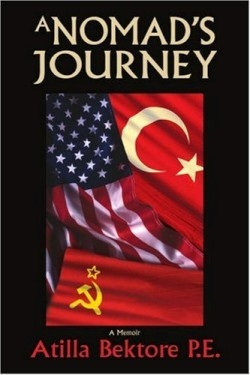A Nomad's Journey
From the deserts of central Asia to the bustling streets of Istanbul and New York this memoir is a striking and lovingly crafted story of a life and career which spans the twentieth century. The narrative opens with Bektore’s father’s youth and covers nineteenth-century nationalism World War I and Russia’s transition to socialism. Bektore then documents his childhood in central Asia his adolescence and career in Turkey his move with his wife to the United States and his career as an engineer. The author is particularly careful to historically and culturally contextualize his story and his life decisions.
Bektore’s writing style is a strange mixture of polished and clumsy; misspellings awkward phrasings and misused words occasionally crop up in this thoughtful and vivid narrative; some sections seem rushed and perfunctory while others are lovingly edited. Although Bektore discusses the privations of his childhood his father’s arrest and lengthy imprisonment in the gulag and his difficult move from Turkey to the United States he never presents his story melodramatically. The narrative skillfully interweaves personal experience with historical exposition:
“I was a very good student in school…and when I turned ten in January of 1932 and was awarded membership in the ‘Leninist Young Pioneers’ a structured organization for children ten to fourteen years old….After my initiation they put a red scarf with a Pioneer’s badge around my neck and I swore to be ‘always ready.’ I ran home proudly to show it to my father. His response was a disappointing ‘very nice’ delivered with a half smile. That was it. Either he disapproved or his mind was on something else. I could not understand it at the time but of course I do now. He did disapprove and there was a great deal on his mind; he was arrested two months later.”
Unfortunately the twenty-eight pages in which Bektore covers World War I and Russia’s movement into communism are heavy going. It is also a pity that he does not give the reader more information about the lives of his brother and sister but this is a minor quibble. His illustrations are useful even if many in the section covering his time in Istanbul are drawn from one of his research sources. While Bektore openly acknowledges that his book is biased overall it is strikingly even-handed and analytical.
Bektore’s informative presentation of his life is ultimately successful and would be greatly improved by the addition of an index and some time with a good copyeditor. The memoir is affecting without being sensational and Bektore handles contentious material without rancor or an overbearing bias. He brings his settings and history vividly to life.
Reviewed by
Val Grimm
Disclosure: This article is not an endorsement, but a review. The publisher of this book provided free copies of the book and paid a small fee to have their book reviewed by a professional reviewer. Foreword Reviews and Clarion Reviews make no guarantee that the publisher will receive a positive review. Foreword Magazine, Inc. is disclosing this in accordance with the Federal Trade Commission’s 16 CFR, Part 255.

